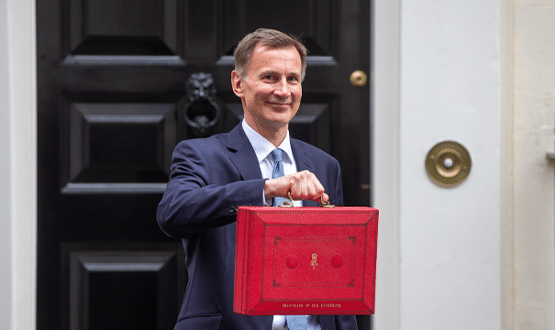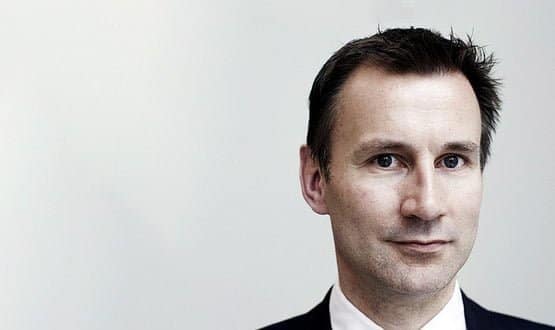Hunt says £2 billion is for ‘change’
- 3 December 2014

Health secretary Jeremy Hunt has said the £2 billion ‘additional’ funding that Chancellor George Osborne has announced in his autumn statement will be used to support change in the NHS.
Speaking at a Reform conference, Hunt said the coalition was behind the ‘Five Year Forward View’ drawn up by Simon Stevens, the chief executive of NHS England, to try and close a projected funding gap of £30 billion by 2020-21.
“This week, the government, the Chancellor, have said ‘ we accept this plan’ and we are backing it with the money the NHS is asking for next year; which is the only year for which a spending review is in place,” he said.
Today's announcement was widely trailed at the weekend, but the headline figure of £2 billion has been challenged by Labour, which accused Osborne of ‘recycling’ cash.
While the money is new in the sense that it was not previously allocated to the NHS, around £750m is coming from an under-spend in the commissioning system and “non-frontline” savings.
Around £200m is likely to go on bailing out trusts in immediate financial distress, with £1.5 billion for "frontline" services. Despite Hunt's presentation, Osborne indicated that just £200m will be put into a "transformation fund" to deliver the first year of the Five Year Forward View.
Speakers at the think-tank conference warned it was essential that as little money as possible was spent on bailouts, and as much as possible on change programmes.
Sir David Dalton, the chief executive of Salford Royal NHS Foundation Trust, who is about to deliver a report on new models for smaller hospitals, said it would be a “missed opportunity” if it was “soaked up” in helping out organisations in difficulty.
Hunt said change was essential if the NHS was going to cope with an ageing population, which he described as “the political challenge of our generation.”
Reprising other recent speeches, he said his ‘four pillars’ for the NHS of the future were a “strong economy”, “better care for people with long-term conditions”, the faster uptake of technology, and better “accountability and transparency”.
He said that to create “stability”, the government was looking at introducing “multi-year planning and commissioning”; while a move to introduce costing for individual patients would help clinical commissioners to invest in innovation by making clear any cost benefit.
He also argued that initiatives such as the recent release of “4,000 pieces of data” onto the MyNHS website, would help staff and patients to see how the NHS was doing, and support a shift from “top-down management” to “peer review” of services.
Speaking earlier in the afternoon, shadow health secretary Andy Burnham outlined similar ideas about the direction of travel for health and social care, and the mechanisms for getting there.
He said Labour was on a “ten year journey” to create an integrated health and social care system, and that he wanted a personalised service, focused on caring for individuals in their home whenever possible.
He said his drivers for achieving this would be a ‘year of care’ tariff to pay for both health and social care that would incentivise prevention, and new rights in the NHS constitution to encourage personalisation.
Returning to the £2 billion announcement, Burnham also warned it was essential that it was not sucked into acute care and that any further increases were not paid for by further cuts to social care. If this happened, he warned, patients would become “stuck” in increasingly “dysfunctional” hospitals.
Despite the near-universal support for integration at #reformhealth, speakers were asked whether it could really deliver the scale of savings needed by 2020-21.
Tony Lambert of Monitor said he hoped it could; while noting that the Five Year Forward View’s plans “depend on continued investment in the next Parliament” that is, as yet, unknown. The plan itself estimates that about £8 billion of additional funding will be needed.
In his statement today, Osborne said the government will provide an extra £2 billion "every year" to the NHS; if it is returned to power.
Shadow Chancellor Ed Balls asked him to clarify whether this would come on topi of flat real terms spending, or whether it woudl come out of further under-spends. He added that the NHS "deserves a proper long-term plan, not a short-term sticking plaster."
Ian Dodge, who became national director of commissioning at NHS England in July told Reform he was “optimistic”; and that the NHS should deliver on the Five Year Forward View targets, and that efficiency might take off if it got things right at the start.
“We have built in an efficiency kicker that suggest if we get it right the increase in efficiency could increase from 2% to 3% towards the end of the [next] Parliament,” he said.
This story was updated at 2pm on Wednesday, 3 December, to reflect the actual content of George Osborne's autumn statement to Parliament, which started at midday.




